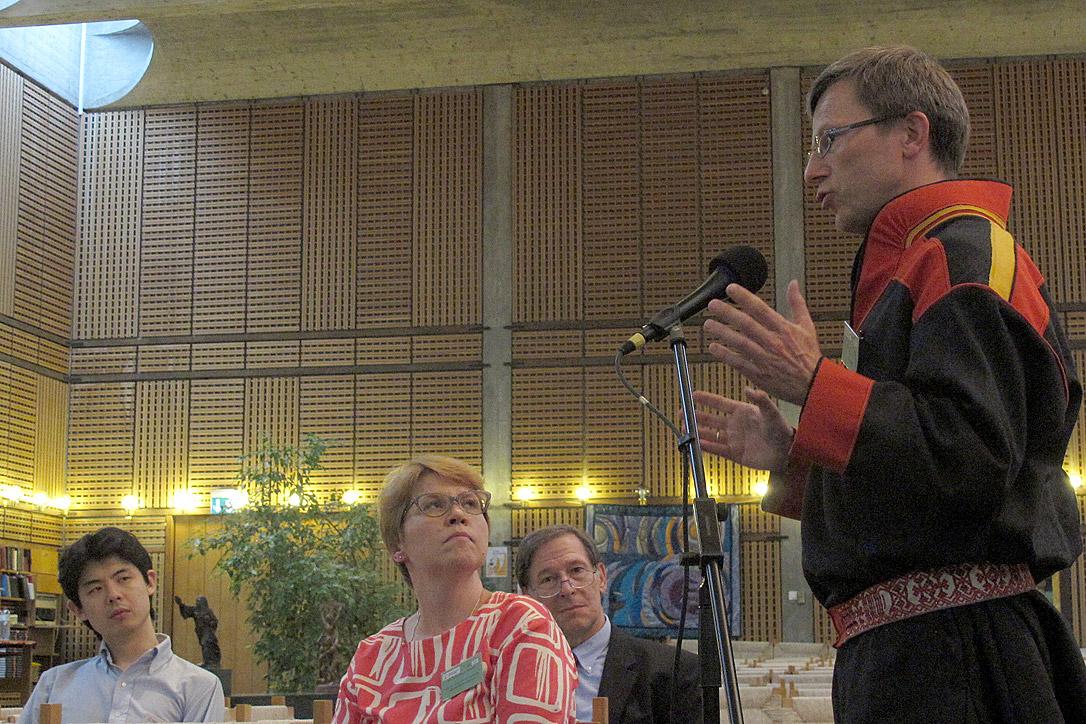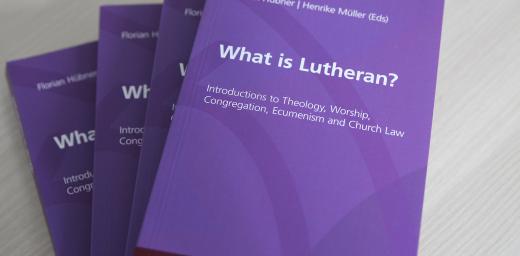“Don’t let our gifts be outside the pilgrimage”

Church of Norway pastor Rev. Tore Johnsen (right), at the Lutheran confessional meeting during the WCC Central Committee. Photo/WCC Marcelo Schneider
Lutherans Voices at WCC Central Committee Meeting
(LWI) - The first full meeting of the new Central Committee (CC) of the World Council of Churches (WCC), a chief governing body of the organization, took place between July 2 and 8 in Geneva, Switzerland. Among thematic plenaries, deliberations, prayers and statements on public issues, there were confessional meetings, in which participants shared impressions with brothers and sisters from their own denominations.
The Lutheran World Federation (LWF) welcomed 35 people at the Ecumenical Center chapel and shared updates about its internal process of reflection on the communion’s self understanding, preparations towards the 500th anniversary of the Reformation in 2017 and youth participation in LWF’s advocacy work.
The audience, comprising Lutheran CC delegates, advisors, observers, stewards and staff members of the WCC and LWF, was encouraged to share insights about the Lutheran contribution to the “pilgrimage of justice and peace,” a call issued by the 10th Assembly of the WCC, held in the Republic of Korea in 2013.
Reflecting on the meaning of walking together, the WCC President for Europe, Archbishop emeritus Anders Wejryd from the Church of Sweden, pointed to some Lutheran theological understandings as helpful tools in the pilgrimage. “Our Trinitarian theology allows us to engage in cooperation with one another without compromising our confessional statements,” he said.
Wejryd also addressed the singular value of Christians’ involvement in advocacy and humanitarian work. “Churches are not NGOs, we are something more and we have to remind people of that,” he stated.
“Luther’s Two Kingdoms Doctrine helps us bringing out basic elements of our advocacy work: we are not only committed to the solutions of the world’s problems through the sharing of resources, but we are also always receiving the gifts from God from our neighbors,” concluded Wejryd.
During the meeting, small group discussions produced a series of different insights to the pilgrimage from a Lutheran perspective. “We highlight advocacy and diakonia,” said Thomas Kang, WCC executive committee member, from the Evangelical Church of the Lutheran Confession in Brazil. “We have to act. We will be prepared to receive gifts from others, but have to prepare to also give away and share resources,” he added.
“Maybe we are the ones who can help make sure that the issues important for women and indigenous people are fully included in the pilgrimage,” said Rev. Tore Johnsen, from the Church of Norway, as he reminded the participants of the Sami people expression, “‘we are on the move and this is better than always staying at the same place.’”
For Rev. Dr Kaisamari Hintikka, LWF Assistant General Secretary for Ecumenical Relations and director of the Department for Theology and Public Witness, the meeting held under the WCC Central Committee agenda was a good opportunity at this early stage of the work of the new CC to collect Lutheran insights for the joint pilgrimage within the ecumenical family.
“As Lutherans, we do have gifts to offer, amongst them our understanding of both men and women serving equally in the ordained ministry of the church, and our witness through diakonia. But we also have gifts to receive from others. What these would be is something to be discussed in the future CC Lutheran meetings,” Hintikka added.
(Written for LWI by Marcelo Schneider and Marianne Ejdersten, WCC Communications)





